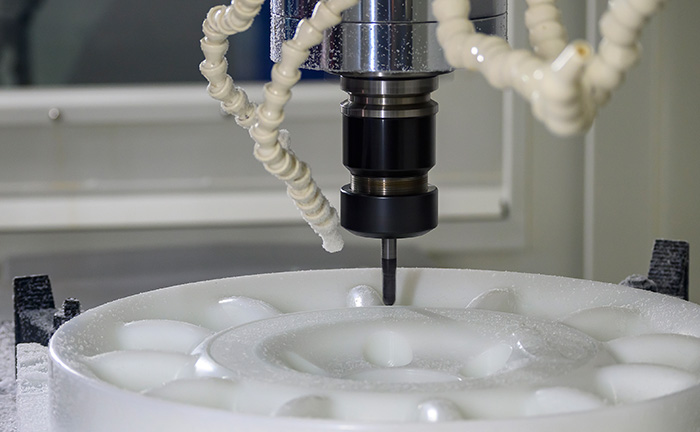Delrin and CNC Machining–it can be used in turning, milling machining or 3 D printing.
Delrin components are often found in automotive and electronics industries. Besides, many sectors that required high-performance parts like gear wheels, housing, screws, nuts, pump components and many other more are also widely use the material.
What are the benefits of making parts with Delrin?
Many machinists found Delrin is easy to work with and be machined by 3-axis, 4 axis, 5 axis milling machine or turning machine. Its properties are very similar to metal parts. Besides machining, it can also be applied in 3D printing and injection mold.

Delrin is a great option between plastic and metals because of its impressive properties. It is good for parts that carry heavy load while maintaining the dimensions and shapes when exposing to humidity and changes of temperature.
Resistance to impact and creep makes Delrin able to expose to fuel and solvents. This property makes Delrin a great material for petrochemical industry.
Delrin is good for many industries uses like automotive, aerospace, energy, healthcare, electronic consumer products and may other sectors because of its excellent material properties. Electrical components like connectors, electronic parts, covers and insulators. When it applied to medical industry, metered dose inhalers and insulin pens are also often made with Delrin. It is ideal material when products have to deal with heavy moisture like kitchen appliance, valve parts, water management, food containers and sports equipment.
Besides machining, Delrin has excellent machinability. It can be cut into a wide variety of geometries using many types of tools and is ideal for injection molding and extrusion processes.
What are the material properties of Delrin?
Delrin’s unique material properties include:
- Excellent dimensional and geometric stability
- Reliable machinability
- Resistance to wear and fatigue
- Good heat and chemical resistances
- Shiny surface and opaque white color
You can use Delrin as 3D printing material. Delrin has the properties to its high degree of crystallinity.
Bellows are Delrin’s chemical properties:
- Toughness at lower temperatures (as low as minus 40 degrees Celsius)
- High mechanical strength
- High rigidity
- Endurance against fatigue
- Impact and moisture resistance
- Ease of fabrication
- Insulating characteristics for electrical use
- Solvent and neutral chemical resistance
Delrin is easily affected by strong acids, strong bases and hot water and steam.
Mechanical properties of Delrin
- Ultimate tensile strength: 60 – 89.6 MPa
- Yield strength: 48.6 – 72.4 MPa
- Young’s modulus (modulus of elasticity): 2.5 – 4 GPa
- Elongation at break: 15 – 75%
- Hardness: 14.6 – 24.8 HV
Thermal properties of Delrin
- Maximum service temperature: 76.9 – 96.9 degrees Celsius
- Thermal expansion coefficient: 75.7 – 202 10^-6 / degrees Celsius
- Thermal conductivity: 0.221 – 0.35 W / (m – degrees Celsius)
Physical properties of Delrin
- UV resistance: Poor
Electrical properties of Delrin
- ESD Safety: Yes
Delrin can be machined by drilling, milling, turning, threading, sawing and tapping.
The properties of the material need to take into account when machining.
